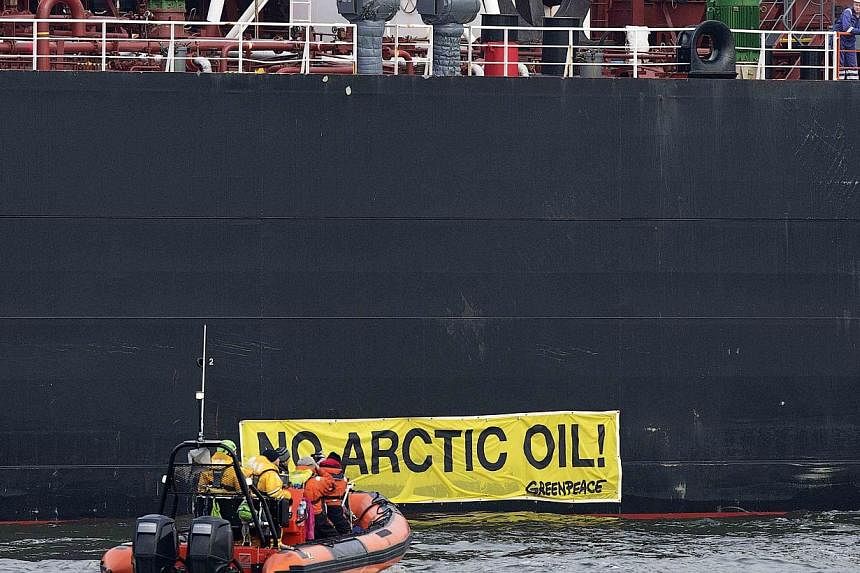MOSCOW (AFP) - Tens of degrees below zero during winter and home to endangered species and remote infrastructure - welcome to the Russian Arctic, a new promised land for oil companies despite clear obstacles.
"The Arctic is one of the world's largest remaining regions of undiscovered conventional oil and natural gas resources," said Mr Rex Tillerson, chief executive for US giant ExxonMobil, during a major industry conference in Moscow last week.
Mr Tim Dodson, a senior executive at Norwegian group Statoil and who was speaking also at the World Petroleum Congress, said the Arctic "is one of the very few remaining areas with the potential to make huge discoveries".
More than 20 per cent of the world's hydrocarbon reserves yet to be discovered are situated in the Arctic, according to a 2008 report by government agency the US Geological Survey (USGS).
Such reserves are said to be located largely in Russia, stretching from Western Siberia to the extreme east of the country.
While Mr Tillerson stresses that the Arctic "is not unfamiliar territory" for the oil industry - large fields have been explored and exploited for decades in Alaska, the north of Norway and in Russia's Sakhalin region - Mr Dodson is quick to point out the challenges.
"The climatic conditions are probably the most visible challenge. Ice, snow, cold and darkness all contribute to an environment that can be both hostile and beautiful."
Mr Dodson added: "To unlock the full potential of the Arctic and also to make Arctic projects commercially viable and globally competitive, we need new technology and innovative business models."
Mr Oleg Mikhaylov, vice-president for oil and gas production at Russian group Bashneft, insisted that exploration of the Russian Arctic "will require significant support from the Russian government in addition to investments by private corporations".
He told the gathering in Moscow: "If you envision full-scale development of the Arctic you have to envision moving millions of tonnes of supplies to one of the most remote regions of the world."
Mr Mikhaylov said this would require expansion of railroad infrastructure and the building of a network of ports, in addition to other major constructions.
Global warming has in recent times caused the Arctic ice cap to melt and open new navigation routes leading to previously inaccessible raw materials.
But there are clear risks and according to Mr Mikhaylov, dealing with an oil spill offshore in the Arctic "would be an even more daunting challenge" than the 2010 BP oil disaster in the Gulf of Mexico.
Environmental groups such as Greenpeace are keen to point out such risks, occasionally at the risk of consequences to themselves.
Russian security forces in September detained 30 Greenpeace activists and journalists and seized their Arctic Sunrise ship following protests over an offshore oil rig owned by Russian energy giant Gazprom.
The 30, including four Russians, were detained for around two months before being bailed and then benefiting from a Kremlin-backed amnesty.
Non-governmental organisations such as Greenpeace claim that Arctic oil and gas exploration not only harms a fragile ecosystem - home to endangered species such as polar bears and cetaceans - but also accelerates climate change.
Faced with such obstacles, energy companies need to achieve technological breakthroughs or see the high costs associated with such exploration potentially end certain Arctic projects.
For now though the drilling continues. Statoil for example is in the process of designing a new class of drilling ships, specially adapted to withstand extreme Arctic weather conditions.
And French group Total has for a number of years worked with Gazprom to find a cost-effective way of exploiting the giant gas field of Shtokman in the Barents Sea.

